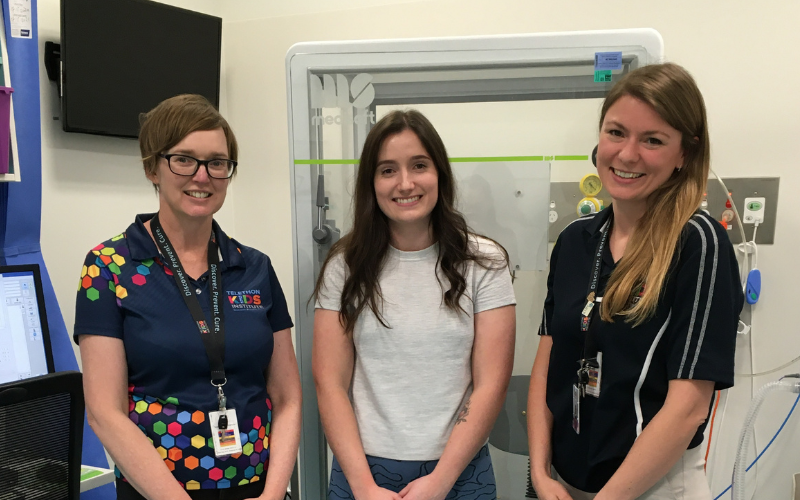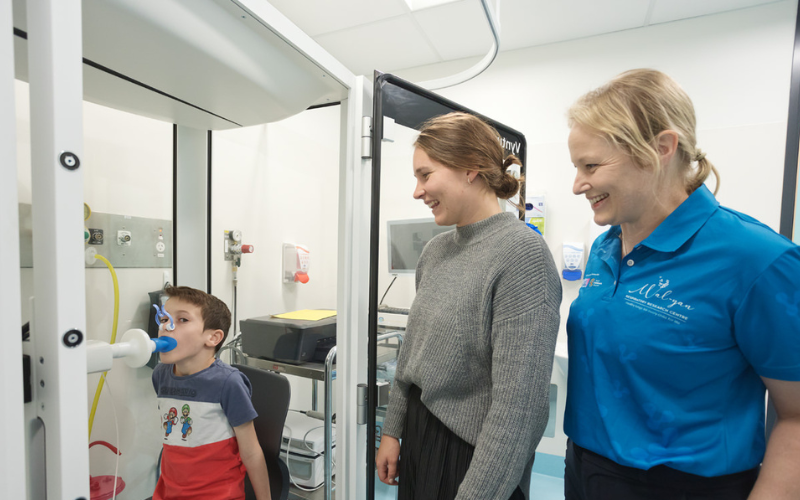Search
Showing results for "preterm birth lungs"
Research
Ventilatory response and stability of oxygen saturation during a hypoxic challenge in very preterm infantsPreterm infants have immature control of breathing and impaired pulmonary gas exchange. We hypothesized that infants with bronchopulmonary dysplasia (BPD) have a blunted ventilatory response and peripheral oxygen saturation (SpO2 ) instability during a hypoxic challenge.
Research
Vitamin A supplementation in very-preterm or very-low-birth-weight infants to prevent morbidity and mortality: A systematic review and meta-Analysis of randomized trialsA previous systematic review showed that intramuscular vitamin A supplementation reduced the risk of bronchopulmonary dysplasia (BPD) in very-low-birth-weight (VLBW) infants. However, more recent studies have questioned this finding.

News & Events
Wal-yan respiratory researchers head to Milan to participate in international congressThe Wal-yan Respiratory Research Centre is proud to have a team of researchers taking part in, and contributing to, the outstanding scientific programme of the European Respiratory Society International Congress, taking place in Milan.

News & Events
New risk factor identified to help predict the long-term lung health of young adults born very pretermA study which set out to determine ways to predict the long-term lung health of young adults born very preterm has shown that a childhood history of respiratory hospital admission should be a key consideration in the management of preterm children and adults.
Research
Elevated leukotriene B4 and 8-isoprostane in exhaled breath condensate from preterm-born infantsInflammation and oxidative stress play a key role in the development of bronchopulmonary dysplasia (BPD), possibly contributing to persistent respiratory morbidity after preterm birth. We aimed to assess if inflammatory markers were elevated in exhaled breath condensate (EBC) of infants born very prematurely (< 32 weeks gestation) at 12-16 corrected months of age, and if increased levels were associated with BPD diagnosis and respiratory morbidity.
Research
Many Healthy LungsIn partnership with Derbarl Yerrigan Health Service and the Broome Regional Aboriginal Medical Service, we aim to improve Aboriginal lung health by determining for the first time the baseline lung function of Aboriginal Australians.
Research
Lung function trajectories throughout childhood in survivors of very preterm birth: a longitudinal cohort studyLung function trajectories are impaired in survivors of very preterm birth
Research
The ventilatory response to hypoxia is blunted in some preterm infants during the second year of lifePreterm birth and subsequent neonatal ventilatory treatment disrupts development of the hypoxic ventilatory response (HVR). An attenuated HVR has been identified in preterm neonates, however it is unknown whether the attenuation persists into the second year of life.

News & Events
Common asthma drug gives hope for better lung health for some preterm babiesA new study has found a common asthma drug is effective for some very premature babies who go on to suffer from lung complications.
Research
Collecting exhaled breath condensate from non-ventilated preterm-born infants: a modified methodExhaled breath condensate (EBC) collection is a non-invasive, safe method for measurement of biomarkers in patients with lung disease. Other methods of obtaining samples from the lungs, such as bronchoalveolar lavage, are invasive and require anaesthesia/sedation in neonates and infants. EBC is particularly appealing for assessing biomarkers in preterm-born infants, a population at risk of ongoing lung disease.
